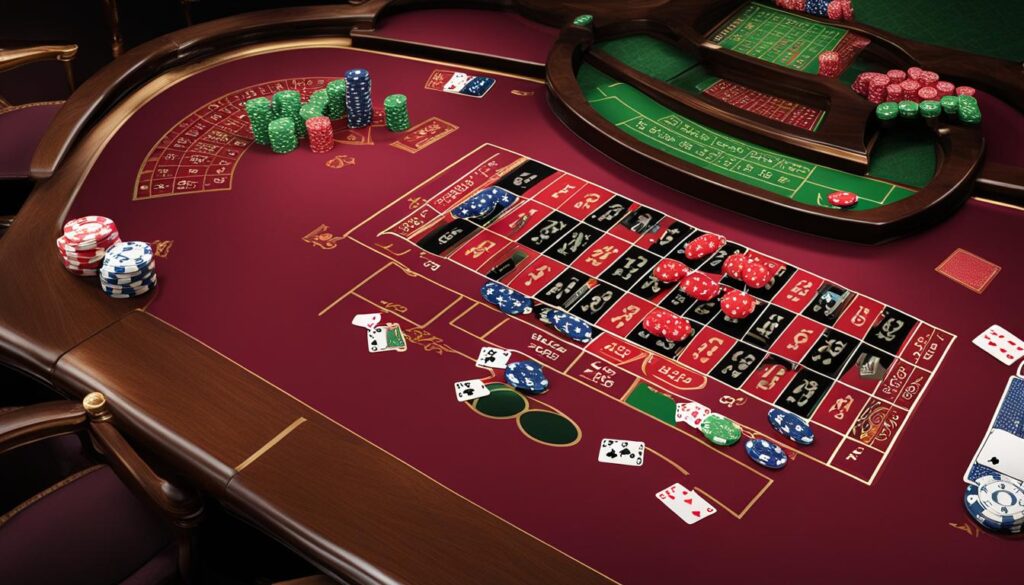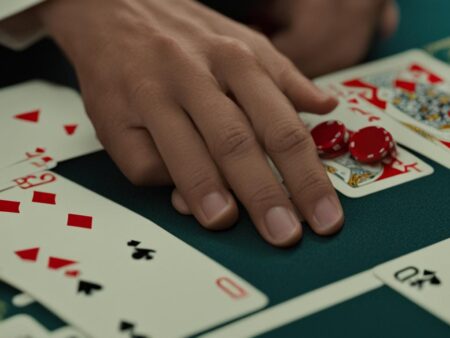Welcome to our in-depth exploration of one of the most popular casino games in the world – blackjack. Many people wonder whether success in blackjack is solely determined by luck or if there is a skill component involved. In this article, we will delve into the intricacies of the game and uncover the truth behind this age-old question.
At first glance, blackjack may seem like a game of chance, with players relying on luck to receive favorable cards. However, there is more to it than meets the eye. While luck does play a role in determining the initial cards dealt, skilled players can employ various strategies and techniques to tip the odds in their favor.
By understanding the rules, implementing basic strategy, and potentially mastering the art of card counting, players can greatly enhance their chances of winning. These elements of skill and strategy bring depth to the game, making it more than just a matter of luck.
So, is blackjack all luck? The answer lies in the combination of luck and skill. While luck places the initial cards in the player’s hand, it is the player’s skill and strategy that determine how they play those cards and ultimately influence the outcome of each hand.
Throughout this article, we will explore the history of blackjack, the rules of play, basic strategy, card counting, bankroll management, table variations, and the importance of practice and patience. By the end, you will have a comprehensive understanding of the game and be able to determine for yourself the balance between luck and skill in blackjack.
Key Takeaways:
- Blackjack is a game that combines both luck and skill.
- Luck determines the cards dealt, but skill influences how players play those cards.
- Strategies like basic strategy and card counting can significantly improve a player’s chances of winning.
- Proper bankroll management is essential for sustaining gameplay and minimizing losses.
- Consistent practice and patience are crucial for developing and honing blackjack skills.
The History of Blackjack
Blackjack, a popular card game played in casinos worldwide, has a fascinating history that dates back centuries. The exact origins of the game are unclear, but it is believed to have evolved from similar card games played in Europe, such as vingt-et-un and quinze. The game made its way to France in the 17th century, where it gained popularity among the aristocracy. Over time, the game spread to other countries, including the United States, where it became known as blackjack.
To understand the history of blackjack, it is important to note that the name “blackjack” refers to the early version of the game, where a player would receive a bonus payout if their hand consisted of the ace of spades and a black jack (either the jack of spades or clubs). The bonus payout is no longer a part of the game, but the name stuck.
Since its introduction to the United States, blackjack has undergone various transformations, adapting to different regional preferences and casino regulations. The game’s popularity continued to rise, and it became a staple in both land-based and online casinos. Today, blackjack remains one of the most widely played and enjoyed casino games worldwide.
Evolution of Blackjack
Throughout its history, blackjack has seen the emergence of various strategies and techniques aimed at improving the player’s chances of winning. These strategies range from basic rules of play to more advanced techniques, such as card counting. The evolution of blackjack and the development of these strategies have contributed to the game’s enduring popularity.
| Time Period | Key Milestones |
|---|---|
| 17th Century | Game played in France; the name “vingt-et-un” (twenty-one) used. |
| 18th Century | Game introduced to the United States as “blackjack”. |
| 20th Century | Edward Thorp publishes “Beat the Dealer” introducing card counting techniques. |
| 21st Century | Advancements in technology lead to the rise of online blackjack and live dealer games. |
As the game continues to evolve, new variations of blackjack have emerged, introducing additional side bets and rule variations. These variations add excitement to the game and offer players a wider range of options to explore.
Rules of Play in Blackjack
In blackjack, understanding the rules of play is essential for players to make informed decisions and increase their chances of winning. Here, we will explore the basic rules that govern how the game is played.
At the start of each hand, players are dealt two cards, while the dealer receives one card face-up and one card face-down. The goal is to obtain a hand value as close to 21 as possible, without exceeding it. Each card in the deck has a specific value: numbered cards are worth their face value, face cards (Jack, Queen, King) are each worth 10, and Aces can be worth either 1 or 11, depending on the player’s preference.
Players have several options during their turn. They can choose to “hit” and receive an additional card to improve their hand. Alternatively, players can “stand” and end their turn without taking any more cards. Another option is to “double down,” which allows players to double their original bet and receive one more card. If a player is dealt a pair, they have the option to “split” the cards into two separate hands. Lastly, players may choose to “surrender,” forfeiting half of their bet and ending their participation in the current hand.
| Action | Description |
|---|---|
| Hit | Take another card to improve the hand. |
| Stand | End the turn without taking another card. |
| Double Down | Double the bet and receive one more card. |
| Split | Divide a pair into two separate hands. |
| Surrender | Forfeit half of the bet and retire from the hand. |
It is important to note that while players have the freedom to make decisions based on their hand and the dealer’s upcard, the dealer is also bound by specific rules. The dealer must continue drawing additional cards until their hand reaches a value of 17 or higher. These rules can vary slightly depending on the casino. Understanding the rules of play provides a foundation for developing effective strategies and making informed decisions throughout the game.
Basic Strategy in Blackjack

When playing blackjack, having a solid understanding of basic strategy is crucial. Basic strategy is a set of rules that players can follow to maximize their chances of winning. It involves making the correct decisions based on the player’s hand and the dealer’s upcard. By following basic strategy, players can reduce the house edge and improve their overall odds of winning.
To implement basic strategy effectively, players should consult a basic strategy chart. This chart provides a detailed guide on the optimal decision to make in each possible combination of player hands and dealer upcards. Whether it’s hitting, standing, doubling down, or splitting pairs, the basic strategy chart can help players make the most informed decision.
It’s important to note that basic strategy is not a guaranteed method of winning every hand. However, by consistently using basic strategy, players can significantly improve their long-term results and make smarter decisions at the blackjack table.
Remember, blackjack is a game of both luck and skill. While luck determines the cards dealt, it is the player’s skill in following basic strategy that can make a difference in the outcome of each hand and ultimately, the overall success at the blackjack table.
Table: Basic Strategy for Blackjack
| Player Hand | Dealer Upcard | Correct Decision |
|---|---|---|
| Hard 5 to 8 | 2 to 9 | Hit |
| Hard 9 | 2 to 6 | Double Down |
| Soft 13 to 15 | 2 to 6 | Double Down |
| Pair of 8s | Anything | Split |
| Pair of Aces | Anything | Split |
Card Counting in Blackjack

Card counting is a strategy used by skilled players to gain an advantage over the casino in blackjack. It involves keeping track of the cards that have been dealt to determine the ratio of high cards to low cards remaining in the deck. This information can be used to adjust betting and playing decisions, increasing the player’s chances of winning.
“Card counting is not about memorizing every single card that has been played, but rather keeping a running tally of the ratio of high to low cards.”
“When the ratio of high cards to low cards is in favor of the player, it indicates that there is a higher probability of getting a blackjack or a hand close to 21. In these situations, players can choose to increase their bets and make more aggressive playing decisions. Conversely, when the ratio is in favor of the dealer, players can minimize their bets and take more conservative actions.”
It’s important to note that card counting requires practice and skill. Casinos are aware of card counting and often employ countermeasures, such as frequent shuffling or increasing the number of decks used, to prevent skilled players from gaining an advantage. Despite these countermeasures, card counting remains a powerful strategy for those who can effectively implement it.
Card Counting Systems
There are various card counting systems that players can learn and utilize in blackjack. Some popular ones include the Hi-Lo Count, the KO Count, and the Omega II Count. Each system assigns a value to each card that is dealt, and players keep a running count based on these values. The running count helps players determine the ratio of high to low cards remaining in the deck and make informed betting and playing decisions.
It’s important to mention that card counting is not illegal, but casinos may ask players to leave if they are caught using this strategy. Therefore, it’s crucial to be discreet and avoid drawing attention when employing card counting techniques in the casino.
Bankroll Management in Blackjack
In the game of blackjack, effective bankroll management is key to ensuring long-term success and minimizing the risk of significant losses. Properly managing your blackjack bankroll involves setting a budget for each gaming session, dividing your bankroll into smaller sessions, determining the amount to wager on each hand based on a percentage of your bankroll, and carefully managing winning and losing streaks.
One important aspect of bankroll management is setting a budget for each gaming session. Determine how much you are willing to spend on blackjack and stick to that budget. This will help prevent you from chasing losses and ensure that you do not gamble with more money than you can afford to lose.
Dividing your bankroll into smaller sessions is another effective bankroll management strategy. Instead of playing with your entire bankroll in one session, split it into smaller portions. This allows you to have more control over your wagers and ensures that a single bad session does not deplete your entire bankroll.
Determining the amount to wager on each hand is also crucial in managing your blackjack bankroll. Many experts suggest betting no more than 1-2% of your bankroll on each hand. This conservative approach helps protect your bankroll in case of a losing streak and allows for more sustained gameplay.
Finally, managing winning and losing streaks is essential in bankroll management. It is important to have a plan in place for both winning and losing sessions. When you are on a winning streak, consider setting aside a portion of your winnings and continuing to play with the remaining amount. Similarly, when you are on a losing streak, it may be wise to reduce your bets or take a break to avoid further losses.
In conclusion, effective bankroll management is a critical component of success in blackjack. By setting a budget, dividing your bankroll, determining wager amounts, and managing streaks, you can protect your funds and enjoy a more enjoyable and sustainable gambling experience.
Table Variations in Blackjack
When it comes to playing blackjack, there are various table variations to choose from. One popular variation is single deck blackjack, which is often preferred by skilled players due to its favorable odds and increased likelihood of card counting. In single deck blackjack, the game is played with only one deck of cards, which means that players have a better understanding of the cards that have been dealt and can make more informed decisions.
Another common table variation is multi-deck blackjack, where multiple decks of cards are used. This variation is more commonly found in casinos and can range from two to eight decks or more. The use of multiple decks in multi-deck blackjack makes card counting more challenging, as it increases the number of possible card combinations and reduces the predictability of the game.
| Table Variation | Number of Decks | Advantages | Disadvantages |
|---|---|---|---|
| Single Deck | 1 | Higher likelihood of card counting, favorable odds | Less common in casinos |
| Multi-Deck | 2-8 or more | Wider availability in casinos | Increased difficulty in card counting |
It’s important for players to consider their playing style and objectives when choosing a table variation in blackjack. Skilled players who are proficient in card counting may prefer single deck blackjack for its increased advantage, while casual players may opt for multi-deck blackjack for its wider availability and simplicity. Ultimately, the choice of table variation should be based on the player’s comfort level and overall strategy.
The Importance of Practice and Patience in Blackjack
When it comes to mastering the game of blackjack, practice and patience are key. While luck may play a role in each hand, it is the skillful implementation of strategies and techniques that can truly improve your chances of winning. By dedicating time to practice and honing your skills, you can become a more confident and successful blackjack player.
Practicing blackjack allows you to familiarize yourself with the rules, card values, and various strategies. It gives you the opportunity to refine your decision-making process and develop a deeper understanding of the game. Whether you prefer playing online or at a land-based casino, setting aside regular practice sessions will help you improve your gameplay and increase your chances of winning.
Patience is equally important in blackjack. It’s essential to remain calm and composed, even in the face of losses or setbacks. Remember that blackjack is a game of probabilities, and not every hand will result in a win. By maintaining patience and sticking to your strategies, you give yourself the best chance of long-term success.
Developing a Practice Routine
To make the most of your practice sessions, it’s important to establish a routine that works for you. Start by setting specific goals for each practice session. This could include focusing on a particular strategy, improving your card counting skills, or analyzing your decision-making process. By having clear objectives, you can track your progress and stay motivated.
Additionally, consider keeping a record of your practice sessions. Take note of any patterns you observe, mistakes you make, or strategies that prove successful. This information can serve as a valuable reference for future sessions, allowing you to refine your approach and make informed decisions during gameplay.
Embracing a Growth Mindset
When practicing blackjack, it’s important to adopt a growth mindset. Embrace the idea that mistakes and losses are opportunities for learning and improvement. Rather than becoming discouraged by setbacks, view them as valuable lessons that can help you refine your strategies and enhance your overall gameplay.
Remember, becoming a skilled blackjack player takes time and effort. By dedicating yourself to regular practice, developing patience, and maintaining a growth mindset, you can improve your blackjack skills and increase your chances of winning in this exciting and rewarding game of chance and strategy.
Is Blackjack All Luck or Skill?
When it comes to the game of blackjack, there has always been a debate surrounding the role of luck versus skill. Some argue that the outcome of each hand is purely determined by luck, while others believe that skill and strategy can significantly influence the game. The truth lies somewhere in between. While luck does play a role in the cards that are dealt, skilled players can use various strategies to improve their chances of winning.
One of the most important strategies in blackjack is basic strategy. This involves making the correct decisions based on your hand and the dealer’s upcard. By following basic strategy, players can minimize the house edge and increase their odds of winning. Additionally, some players employ card counting techniques to gain an advantage over the casino. Card counting involves keeping track of the cards that have been dealt to determine the ratio of high cards to low cards remaining in the deck. With this information, players can adjust their betting and playing decisions to their advantage.
However, it’s important to note that even with skill and strategy, there is no guarantee of winning every hand. Blackjack is still a game of chance, and luck can play a significant role in the outcome. It’s important for players to manage their expectations and understand that losses are a part of the game.
So, is blackjack all luck or skill? The answer is that it’s a combination of both. While luck determines the cards that are dealt, skill and strategy can greatly impact the player’s overall success. By understanding the game, utilizing effective strategies, and managing their bankroll, players can increase their chances of winning in this exciting and popular casino game.
Conclusion
In conclusion, the game of blackjack is a fascinating blend of luck and skill. While luck plays a significant role in the cards that are dealt, skilled players understand that strategy and tactics can greatly affect their overall success. By employing techniques like basic strategy and card counting, players can tilt the odds in their favor and increase their chances of winning.
However, it’s important to remember that no strategy can guarantee a win every time. Blackjack is still a game of chance, and there will always be an element of uncertainty. But by combining skillful decision-making with a solid understanding of the game’s rules and probabilities, players can improve their outcomes and minimize the house edge.
Another crucial aspect to consider is proper bankroll management. By setting a budget, dividing the bankroll wisely, and managing winning and losing streaks, players can protect their funds and ensure that they can continue playing and enjoying the game for a longer time.
In conclusion, blackjack is a captivating game that offers a unique blend of luck and skill. By embracing the strategic elements and employing effective techniques, players can enhance their chances of success and make the most of their blackjack experience. So dive into the world of blackjack, sharpen your skills, and may fortune favor the bold!
FAQ
Is blackjack purely based on luck?
No, while luck does play a role in the game, there are also elements of skill and strategy that can influence the outcome.
What is the history of blackjack?
Blackjack has a rich history that can be traced back to similar games played in Europe, such as vingt-et-un and quinze. It is believed to have been played in France as early as the 17th century.
How do you play blackjack?
In blackjack, players aim to create a hand with a total value close to 21 without going over. Players compete against the dealer and have the option to hit, stand, double down, split pairs, or surrender.
What is basic strategy in blackjack?
Basic strategy is a set of rules that players can follow to maximize their chances of winning in blackjack. It involves making the correct decisions based on the player’s hand and the dealer’s upcard.
What is card counting in blackjack?
Card counting is a strategy used by skilled players to gain an advantage over the casino. It involves keeping track of the cards that have been dealt to determine the ratio of high cards to low cards remaining in the deck.
How do you manage your bankroll in blackjack?
Proper bankroll management is crucial in blackjack to protect your funds. It involves setting a budget, dividing the bankroll into smaller sessions, and determining the amount to wager on each hand based on a percentage of the bankroll.
What are the table variations in blackjack?
Blackjack can be played with varying numbers of decks, ranging from one to eight or more. The number of decks used can impact the strategy and the player’s odds of winning.
How important is practice and patience in blackjack?
Practice and patience are essential in becoming a skilled blackjack player. Regular practice allows players to familiarize themselves with the rules, strategies, and techniques of the game.
Is blackjack purely luck or skill?
Blackjack is a combination of both luck and skill. While luck determines the cards dealt, skilled players who use strategies like basic strategy and card counting can improve their odds of winning.







